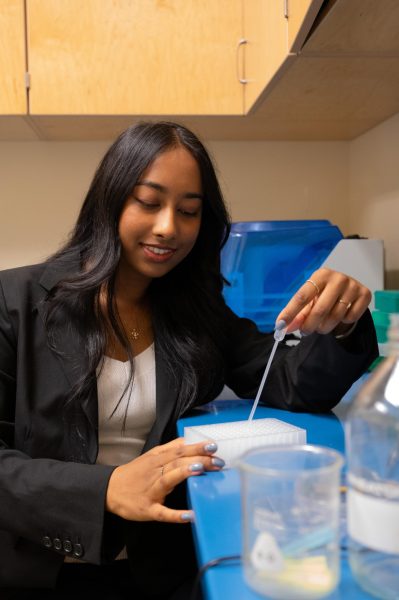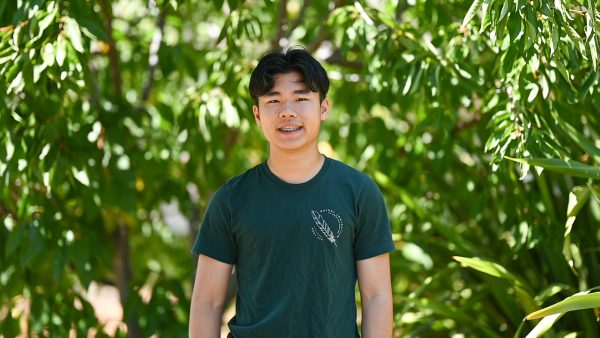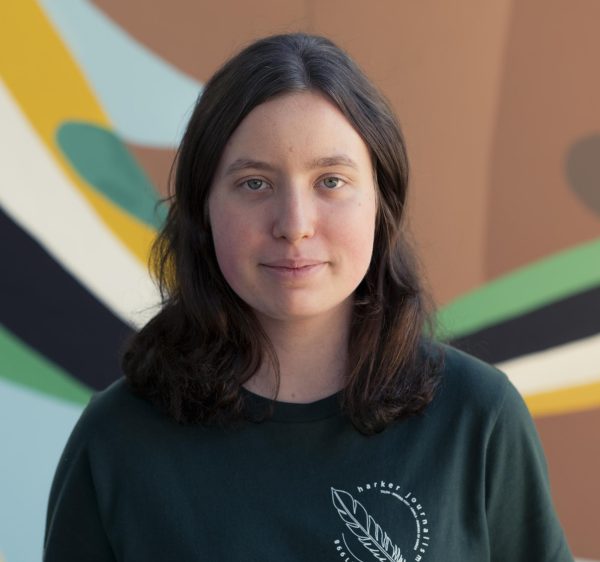
Positioned around a roundtable, United Nations (UN) youth delegates toss ideas back and forth. Anika sits on one end, and soon, the entire discussion will be condensed into a speech of just two to five minutes that she will present. This is the process of preparing for a UN conference, where representatives discuss global issues and advocate for policies. Despite the limitation on time posing difficulties, the complexity it creates in composing the address is Anika’s favourite part of activism.
“You find your three main points and then you discuss with your group at the table and then you write the speech,” Anika said. “Although that might seem boring and the talking part might be the most fun, getting together, discussing and sharing your ideas and working through why you think one problem is more important at the time than another also broadens your own opinions and your own mentality because you are able to learn from others and the way they think.”
As a rising junior, Anika noticed that students outside the Bay area that she met over the summer and her cousins in India both mentioned issues regarding STEM, like gender disproportionality and improper school funding of the department. Having an interest in STEM and performing research on topics in the field herself, Anika searched for a means to approach such problems, drawing her back to the United Nations (UN). During her sophomore year, she had previously participated in a model UN conference. The UN focuses on improving wellbeing and promoting international peace, and Anika now serves as a youth delegate for the United Nations Major Group for Children and Youth (MGCY).
Initially, her role as a younger member within the organization posed challenges in securing opportunities to speak. Although she expected most members to be close to her age, the youth delegate program for the UN also includes young adults, meaning members can be up to 30 years old.
“I thought there’d be a lot more high school students my age showing up or wanting to learn more about the UN, but I was the youngest there, and it was hard to get my voice heard, because I did have the least experience in attending the UN,” Anika said.
While more experienced members took control in her first conference, Anika knew that she wanted her opinion to be heard in some way. Sending articles to speech writers for ideas resulted in the organization eventually asking whether she wanted to put her ideas directly on documents. By the second, she assisted in writing bills and speeches to be spoken on behalf of the Girls Learn Organization. Close friend and senior Emma Milner admires Anika’s willingness to confront obstacles and achieve her goals.
“She always holds a really positive attitude, no matter what,” Emma said. “It’s really difficult to see challenges as your own shortcomings and not be discouraged by that, but even when she doesn’t get the score she wants or the leadership role that she wants, she’s still somehow always looking to the future. I haven’t met a lot of people who are so forward looking and don’t settle for what they have.”
MGCY reaches out to numerous organizations to include their ideas in speeches and maximize partnerships. Exposure to the wide range of beliefs from the institutions has developed Anika’s understanding of communication, allowing her to be less hesitant and more vocal in discussions.
“Although you want to be friends with everyone, you still have to be careful with who you share your opinions with because it can be political at times and you don’t want to lose that person who could actually be an asset to your organization just by saying something that angers them,” Anika said. “Understanding the mentality of others in just a simple conversation is something I’ve learned and taken from the UN and that helps in my day to day life too.”
Senior Jia Jia Jiang oberved how Anika applied her conversational abilities and approach to dealing with issues improved through activism to her Honors Entrepreneurship 2 class. The course is designed to help current business owners with scaling their company.
“She’s very good at voicing the concerns of other people, and she’s also very good at problem solving because she tries to come up with unique and reasonable solutions that people can use,” Jia Jia said. “Sometimes, people tend to be very idealistic in trying to find solutions, but Anika sees different ways to get to a good solution.”
For Anika, the frustrating aspect of the UN lies in how final decisions are left up to the general assembly, the main policy-making organ, and delegates only provide their output on issues. Genuine Belief in the movements that she advocates for plays a large role in keeping Anika patient and confident, and the importance of authentic interest carries outside of activism for her.
“I’m a big proponent of the fact that you have to enjoy what you do to a certain extent in order to be able to continue,” Anika said. “I like research but that doesn’t mean I love research. I don’t like every single thing that goes into it, but I do like the end product of being able to publish something, publish your research in a journal or being able to talk about your research in a conference, so I like seeing those end goals come to fruition.”
English teacher Nicholas Manjoine first taught Anika during her junior year for Honors American Literature. Manjoine noticed how Anika’s emphasis on genuineness is visible through their interactions in the classroom.
“She has a love for what she does and a dedication that’s not transactional,” Manjoine said. “Sometimes students just do stuff to look good or for their CV for college, but it is super authentic coming from Anika. One of life’s big goals is love of learning, kindness and service to others and Anika hits that really hard and in a way that’s totally natural for her, which I admire a lot.”


















![“[Building nerf blasters] became this outlet of creativity for me that hasn't been matched by anything else. The process [of] making a build complete to your desire is such a painstakingly difficult process, but I've had to learn from [the skills needed from] soldering to proper painting. There's so many different options for everything, if you think about it, it exists. The best part is [that] if it doesn't exist, you can build it yourself," Ishaan Parate said.](https://harkeraquila.com/wp-content/uploads/2022/08/DSC_8149-900x604.jpg)




![“When I came into high school, I was ready to be a follower. But DECA was a game changer for me. It helped me overcome my fear of public speaking, and it's played such a major role in who I've become today. To be able to successfully lead a chapter of 150 students, an officer team and be one of the upperclassmen I once really admired is something I'm [really] proud of,” Anvitha Tummala ('21) said.](https://harkeraquila.com/wp-content/uploads/2021/07/Screen-Shot-2021-07-25-at-9.50.05-AM-900x594.png)







![“I think getting up in the morning and having a sense of purpose [is exciting]. I think without a certain amount of drive, life is kind of obsolete and mundane, and I think having that every single day is what makes each day unique and kind of makes life exciting,” Neymika Jain (12) said.](https://harkeraquila.com/wp-content/uploads/2017/06/Screen-Shot-2017-06-03-at-4.54.16-PM.png)








![“My slogan is ‘slow feet, don’t eat, and I’m hungry.’ You need to run fast to get where you are–you aren't going to get those championships if you aren't fast,” Angel Cervantes (12) said. “I want to do well in school on my tests and in track and win championships for my team. I live by that, [and] I can do that anywhere: in the classroom or on the field.”](https://harkeraquila.com/wp-content/uploads/2018/06/DSC5146-900x601.jpg)
![“[Volleyball has] taught me how to fall correctly, and another thing it taught is that you don’t have to be the best at something to be good at it. If you just hit the ball in a smart way, then it still scores points and you’re good at it. You could be a background player and still make a much bigger impact on the team than you would think,” Anya Gert (’20) said.](https://harkeraquila.com/wp-content/uploads/2020/06/AnnaGert_JinTuan_HoHPhotoEdited-600x900.jpeg)

![“I'm not nearly there yet, but [my confidence has] definitely been getting better since I was pretty shy and timid coming into Harker my freshman year. I know that there's a lot of people that are really confident in what they do, and I really admire them. Everyone's so driven and that has really pushed me to kind of try to find my own place in high school and be more confident,” Alyssa Huang (’20) said.](https://harkeraquila.com/wp-content/uploads/2020/06/AlyssaHuang_EmilyChen_HoHPhoto-900x749.jpeg)




